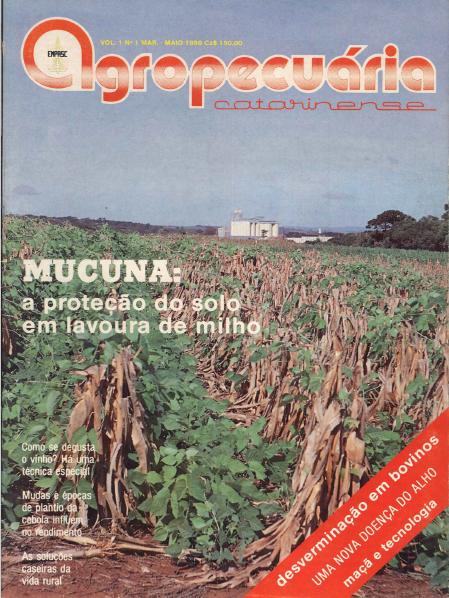About the Journal
Focus and Scope
Agropecuária Catarinense (RAC) is a scientific journal that publishes technical and scientific papers on original topics in agricultural research, rural extension and fisheries. The journal is published quarterly (April, August and December) and has been published by Epagri since March 1988. RAC has been available online since 2016 via the OJS system, including issues published from 1998 to 2024. The target audience is composed of researchers, extension agents, professors, undergraduate and graduate students and professionals in agricultural and related sciences. Articles submitted by authors from research and education institutions are accepted.
Publisher
The Agricultural Research and Rural Extension Company of Santa Catarina – EPAGRI – is a public company, linked to the Government of the State of Santa Catarina through the State Secretariat of Agriculture, Fisheries and Rural Development. The creation of the Company in 1991 combined research and rural and fishing extension work, adding decades of experience in different areas and further strengthening the sector. Find out more about Epagri on the website https://www.epagri.sc.gov.br/
Indexers
Agropecuária Catarinense is present with fifteen indexers/repositories: Agrobase (Mapa); Agris (FAO); Diadorim (Ibict); Miguelim (Ibict); CAB international; DOAJ; EZ3 (Electronic Journals Library – University Library of Regensburg); FSTA, PKP Index; Capes Periodicals; Open Access Journals (CNEN); Redib (Ibero-American Network for Innovation and Scientific Knowledge; Latindex (catalog 2.0), Oasis (Ibict) and La referenç (Federated Network of Institutional Repositories of Scientific Publications).
Publication ethics
Agropecuária Catarinense is aligned with good practices for strengthening ethics in scientific publications. More information on publication ethics guidelines can be found on the Committee on Publication Ethics - COPE website (https://publicationethics.org/).
Authorship
All authors must have contributed to the work submitted to Agropecuária Catarinense, in order to justify their name as author of the manuscript. Contributions from anyone who does not meet the authorship criteria must be listed in the Acknowledgements section. In cases of disputes regarding authorship, contact should first be made with the corresponding author, as they are responsible for the veracity of the information when submitting the work, and, if necessary, with all authors. In the event of a deadlock, the authors' affiliation institutions or the funding institutions involved in the development of the research are contacted.
As of December 2024, the journal has adopted the Credit taxonomy as a way to better characterize the roles of the authors of its articles. The measure aims to align the journal with best editorial practices and reinforce its commitment to the open science movement. Thus, authors of manuscripts submitted to the journal must have their roles defined when submitting the work (see new submission letter template) and also in its final approved version.
CRediT (Authorship Contributions Taxonomy) is a high-level taxonomy, including 14 roles, that can be used to represent the roles normally played by authors in academic and scientific production. Its purpose is to promote transparency regarding the contributions of authors in scientific works, enabling improvements in attribution, credit and accountability systems. The roles describe the specific and individual contributions of each author to academic and scientific research.
To learn more, see: Official Credit project website (https://credit.niso.org/) or Scielo blog (https://blog.scielo.org/blog/2020/01/23/devemos-adotar-ferramentas-para-diferenciar-as-contribuicoes-em-trabalhos-academicos/)
Misconduct guidelines
Agropecuária Catarinense will publish, whenever necessary, errata, retractions and expressions of concern about published material when there are suspicions of misconduct in the research and publication of an article. Examples of misconduct include fabrication or falsification of data and images. Plagiarism is also considered misconduct. The journal reviews all articles accepted for publication with CopySpider or similar anti-plagiarism software. The evaluation process is meticulous in identifying such misconduct. If there are any doubts, the authors are asked for supporting data on the methodology and results. In the event of misconduct being detected, the authors' affiliation institutions or funding institutions involved in the development of the research are notified. Suspected ethical violations may be reported by anyone at any time, via email to editoriarac@epagri.sc.gov.br.
Conflict of interest
The journal requires all authors to disclose any potential sources of conflict of interest in the

First edition of the journal in 1988
In 2020, the journal underwent a new process of change, now focusing on the scientific research. In this new phase, Agropecuaria Catarinense stopped disclosing the journalistic part, remaining basically with the different types of scientific works.



